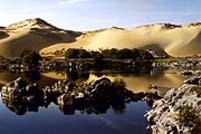 |
|
| The Pioneers of Egyptology―Howard Carter |
 |
|
|
|

In 1891, a young Englishman arrives in Egypt. His name is Howard Carter. He is immediately captivated, and resolves to stay―little realizing that his name might be linked with the most incredible discovery of the century―the tomb of boy-king Tutankhamun. Gaston Maspero, the Director of Egyptian Antiquities, sees the potential in the young man. Carter is appointed Inspector of Antiquities of the southern part of Egypt. His life as Inspector takes him all over Southern Egypt. But his "bad character" costs him his career in Egypt, and he is obliged to resign.
An introduction to Lord Carnarvon, an English aristocrat, offers a new start. Between 1907 and 1912, the two men obtain permission to excavate in the village of Gourna on the west bank of Thebes. Over the following years, Carter concentrates solely on finding a single tomb―the coveted, illusive resting place of the young pharaoh―Tutankhamun. On the fourth of November 1922, at ten o'clock in the morning, the workmen uncover part of a stairway, four meters deep, underneath the entrance to Ramses' tomb.
 Piece by piece, the doorway is unblocked, revealing a sloping corridor. After emptying it, they find another doorway, identical to the first one, covered in seals of the boy-king. Not knowing what to expect, Carter makes a small hole and holds a candle to the opening. It does not take Carter and Carnarvon long to realize the enormity of their discovery, and the implications. Piece by piece, the doorway is unblocked, revealing a sloping corridor. After emptying it, they find another doorway, identical to the first one, covered in seals of the boy-king. Not knowing what to expect, Carter makes a small hole and holds a candle to the opening. It does not take Carter and Carnarvon long to realize the enormity of their discovery, and the implications.
(CCTV-8, October 9)
|
|
| Editor: Zhao Xuan CCTV.com |
|
|
|
|
|
 |



